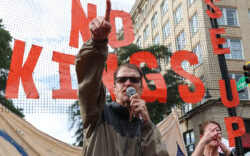This year marks the 50th anniversary of Earth Day, the Apr. 22, 1970 mobilization of millions of Americans who rallied in Washington, DC, and joined environmental cleanups and teach-ins all across the nation. Half a century after Earth Day shined a spotlight on the fragile ecology of our planet, protecting the global environment is needed now more than ever, and millions of citizens in America and around the world are combining hope and action to save our planet’s air, land and water for generations yet unborn. Babies born in this country today may live to see the year 2100. The kind of world that they will inherit in the not so far away future depends on political and economic decisions that are made today.
President Trump’s rollbacks of environmental accords and protections, and his “fox guarding the hen house” approach to staffing government agencies like the Department of the Interior and the Environmental Protection Agency, have led to a resurgence in the environmental movement nationally and locally. Here in Athens, on Friday, Feb. 14 from noon to 3 p.m., the Georgia Climate Change Coalition will gather on the lawn between the Tate Center and the Miller Learning Center on the University of Georgia campus.
Concern for the environment is much in the news in this precarious world of 2020, but back around the year 1800, British poet William Wordsworth eloquently warned that, “Little we see in Nature that is ours;/ We have given our hearts away, a sordid boon.” A century after Wordsworth penned his poetry, an American president, Theodore Roosevelt, pushed policies of conservation, saying, “Here in the United States, we turn our rivers and streams into sewers, we pollute the air, we destroy forests and exterminate fishes, birds and mammals—not to mention vulgarizing charming landscapes with hideous advertising.”
Roosevelt used his authority to create the U.S. Forest Service and establish dozens of national forests, five national parks, 51 federal bird reserves and 18 national monuments. In 1906, he signed the Pure Food and Drug Act after unsafe and unsanitary conditions in the American meatpacking industry were exposed by Upton Sinclair’s novel The Jungle. When Democrat Franklin D. Roosevelt became president in 1933, he continued the concern for the environment voiced by his Republican cousin during his White House terms from 1901–1909.
FDR’s Civilian Conservation Corps helped more than 3 million young men and their families through the Great Depression. CCC workers fought forest fires, planted trees, built woodland trails, bridges and wildlife refuges and maintained campgrounds that Americans still enjoy today. As the world burns with wildfires in Australia, South America and other locales, the words of Franklin Roosevelt are prescient and relevant for us today: “A nation that destroys its soils destroys itself. Forests are the lungs of our land, purifying the air and giving fresh strength to our people.”
Later presidents of both political parties expressed concerns about assaults on the environment. Democrat John F. Kennedy’s administration coincided with the publication of Rachel Carson’s blockbuster book about pollution, Silent Spring. JFK said, “I look forward to an America which will not be afraid of grace and beauty, which will protect the beauty of our natural environment.” When Kennedy’s GOP rival, Richard Nixon, gave a State of the Union Address in 1970—just three months before the first Earth Day—Nixon said, “Clean air, clean water, open spaces—these should once again be the birthright of every American.”
Today, that birthright is being squandered, as the time on the famous “Doomsday Clock” of the Bulletin of the Atomic Scientists was recently moved to 100 seconds from the metaphorical midnight of planetary disaster. The Doomsday Clock has been a feature of the bulletin for more than 70 years, and this year, the scientists at the publication say that we are “closer to apocalypse than ever” because of threats from nuclear weapons, environmental catastrophe and cyber warfare. Such dire warnings are needed and should be heeded, but there is cause for hope when millions of this planet’s citizens want to leave a livable Earth to the citizens of the future. The meek will not inherit the Earth of tomorrow if the mean inhibit the Earth of today.
Like what you just read? Support Flagpole by making a donation today. Every dollar you give helps fund our ongoing mission to provide Athens with quality, independent journalism.










